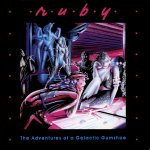"In his house at R'lyeh dead Cthulhu waits dreaming."
"That is not dead which can eternal lie,
And with strange aeons even death may die."
Based on H.P. Lovecraft's classic horror story and filmed as a silent picture as if the film were made when the story was written in 1927, The Call of Cthulhu is a work of creative genius. What makes it unique is the work itself: they just don't make film narratives like this anymore. Heck, they don't make book narratives like this anymore.
The plot moves forward with slow deliberation, as layer after layer of mystery is peeled away by a succession of characters, each of whom has his own story to tell. First is the Nephew, who is relating his tale to a man he has hired to destroy the research papers he has inherited from his Grand-Uncle. The narrative then turns to the Grand-Uncle's tale, who in turn relates the narratives of a young Boston man plagued by strange dreams, a Professor of Anthropology, a Police Inspector, and finally the Second Mate of a Norwegian ship. The narrative then returns to the Nephew who concludes by urging once again that the papers be destroyed.
What I found fascinating about this approach is that while most of our modern tale-telling retains a somewhat equal level of complexity--flashback, flash forward, reverse narratives, and so on--we, the audience, experience the events as they are happening. There is rarely a sense that someone is relating something that has already happened. Even when characters catch up to one another, we expect them to paraphrase or relate their adventures off screen: There is no need for us to witness it again for we have already seen it. There is a Show-and-Tell quality to old-style film making that is absent from the newer Show-Don't-Tell philosophy. And in response to this rapid, visual-based storytelling in film, books have also sped up their narratives and shifted to more image-based (rather than language-based) plots.
Another thing I found clever about their using the silent film format to tell this story is that we never hear anyone pronounce the nearly unpronounceable word "Cthulhu." I made it a point to listen to others' pronunciation when buying my ticket at the Box Office: we all mangled it. But perhaps that is a blessing. Perhaps pronouncing the name aright would summon the alien-beast-god from the pit.
Finally, I would like to close with a quote from Lovecraft's story, which was also used in the movie. It puts a finger, I think, on the horror we humans feel for too much enlightenment. I don't know if I entirely agree with it, but it certainly illuminates the tension we see between those who are pushing forward for scientific discovery and those who are recoiling from it.
"The most merciful thing in the world, I think,
is the inability of the human mind to correlate all its contents.
[...] some day the piecing together of disassociated knowledge will
open up such terrifying vistas of reality, and of our frightful position therein,
that we shall either go mad from the revelation or flee from the deadly light
into the peace and safety of a new dark age."
~H.P. Lovecraft
Director Andrew Leman Producer Sean Branney, Andrew Leman Executive Producer Sean Branney, Andrew Leman Co-Producer Chris Lackey Writer Sean Branney Cinematographer David Robertson Editor David Robertson Cast Matt Foyer, David Mersault, Patrick O'Day Film Info 47min





No comments:
Post a Comment